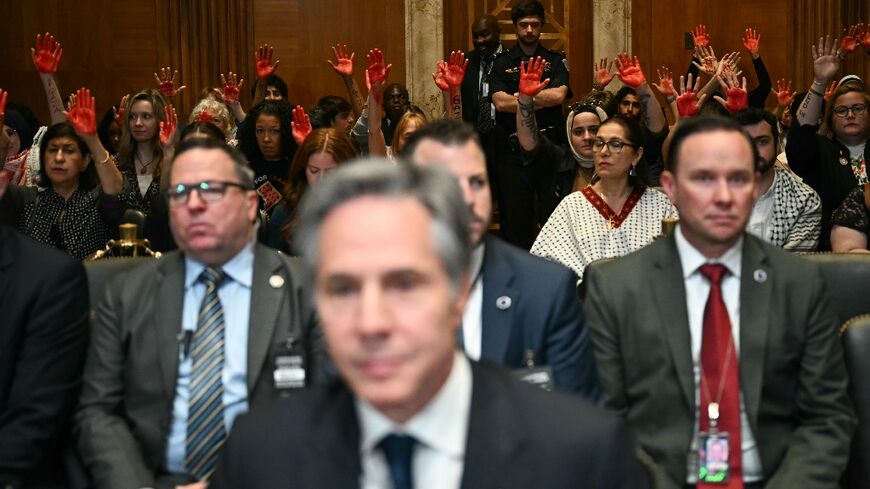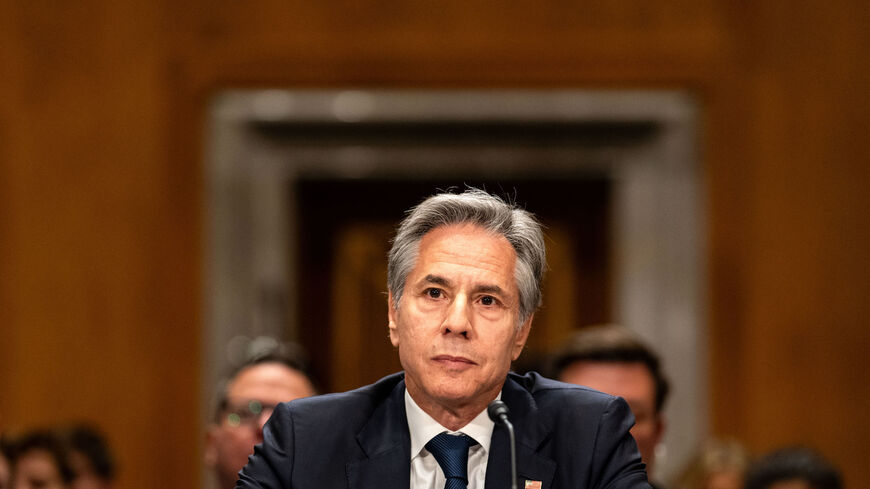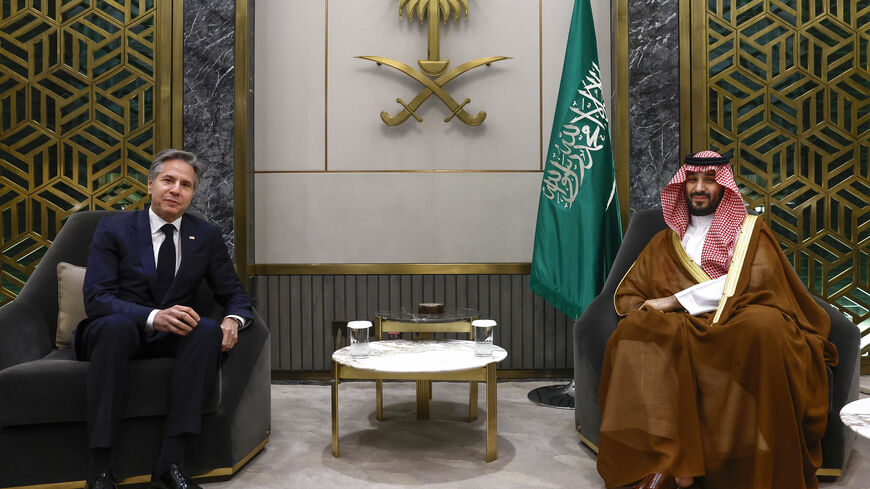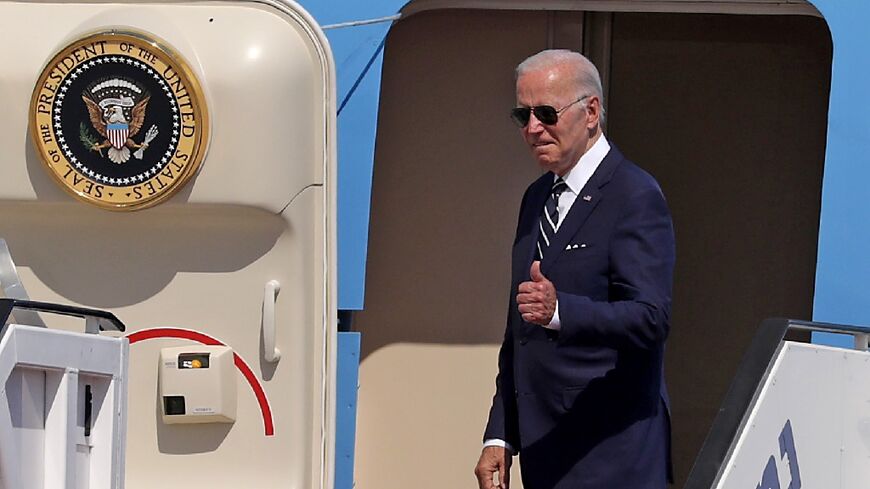Biden’s grand bargain between Saudi Arabia and Israel hangs by a thread
Diplomatic sources briefed on the discussions suggest it would likely fall short of Article 5 of the United States’ 1960 treaty with Japan, but would likely go beyond the benefits of major non-NATO ally.
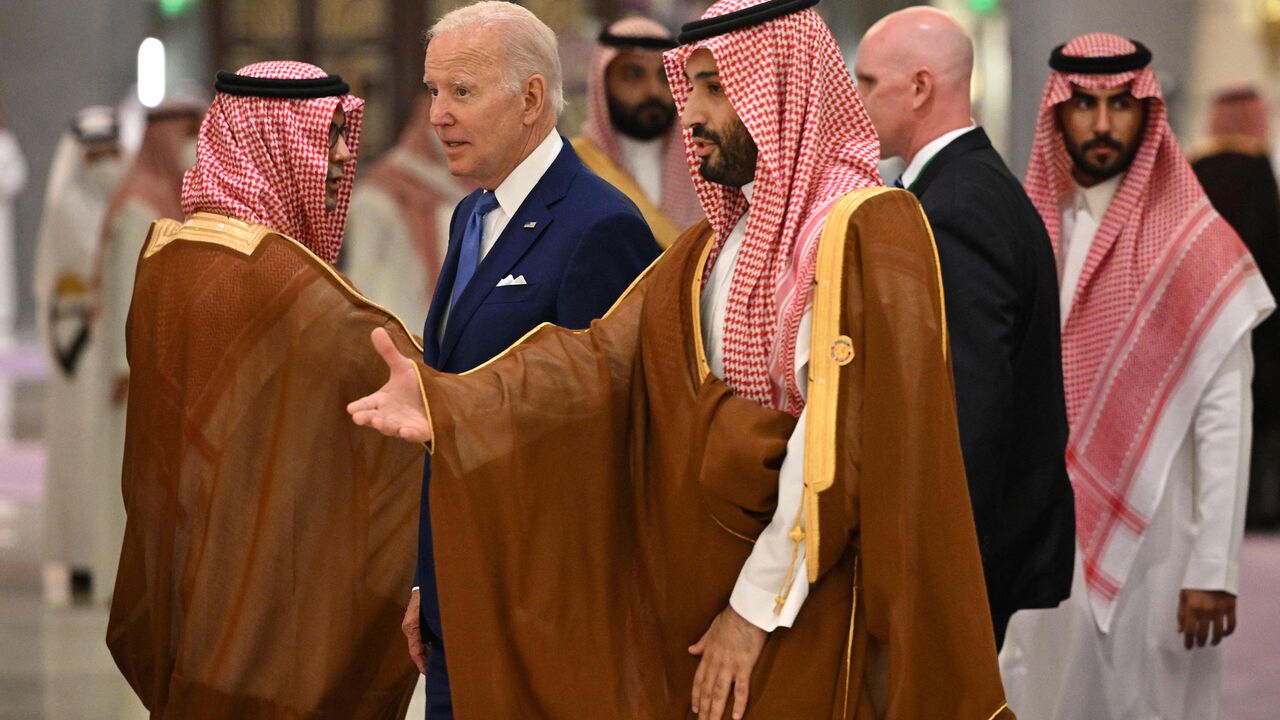
This is an excerpt from Security Briefing, Al-Monitor's weekly newsletter covering defense and conflict developments in the Middle East. To get Security Briefing in your inbox, sign up here.
WASHINGTON — Having averted a regional conflict with Iran, the Biden administration now finds itself reliant on an eleventh-hour ceasefire deal between Hamas and Israel to salvage its Middle East strategy.
The pieces are largely in place for a historic US defense pact with Saudi Arabia, one that would help unlock Riyadh’s normalization of ties with the Jewish state, thus enabling a mutual flow of capital and military cooperation that could further isolate Iran.
"On the bilateral agreements between the kingdom and the United States, we are very, very close, and most of the work has already been done," Saudi Foreign Minister Faisal bin Farhan said at the World Economic Forum meeting in Riyadh on Monday, comments that were also echoed by US Secretary of State Antony Blinken.
Details of the long-sought US-Saudi pact have not been made public. Diplomatic sources briefed on the discussions suggest it would likely fall short of Article 5 of the United States’ 1960 treaty with Japan, which commits the United States to defend Japan if attacked. But it would likely go beyond the benefits of major non-NATO ally status and the clauses entailing a duty to consult on defensive steps that are baked into Washington’s existing agreements with other Gulf states.
Yet the cornerstone needed to achieve congressional approval for the proposed agreement, Saudi normalization with Israel, remains elusive. One of Crown Prince Mohammed bin Salman’s key demands — a commitment by Israeli leaders to take irreversible steps toward Palestinian statehood — has not been met. To get that, US officials say that the war in Gaza needs to end first.
Israel’s prime minister, Benjamin Netanyahu, facing intense domestic pressure, is more intent on finishing off Hamas than on offering any grand concessions to the Palestinians. Netanyahu this week reiterated his vow to drive the IDF into Rafah “with or without” a cease-fire agreement.
The Biden administration is pulling out all the stops to prevent that, while redoubling pressure on Hamas to urgently accept the latest cease-fire proposal.
“There just has to be a deal,” White House National Security Council spokesperson John Kirby told reporters on Tuesday, when asked whether the administration has a plan B.
“If we can get a cease-fire, we can get something more enduring, then maybe end the conflict and then maybe move forward with normalization,” Kirby said. “But it has to start with a deal.”
In pursuit of that, the Biden administration appears to be scrupulously avoiding squandering any goodwill with Israeli leadership. Earlier this week, the State Department held off on sanctioning four Israeli security units deemed to have grossly violated international humanitarian law, in what some have interpreted as the latest conciliatory gesture toward Netanyahu's government.
If there's been reciprocation, it has not been evident. Blinken met with Netanyahu for nearly three hours on Tuesday to push for more humanitarian aid into Gaza and stay the invasion of Rafah, for which Pentagon chief Lloyd Austin this week warned Israel has not adequately prepared. A source briefed on the meeting suggested it did not go well for the US side, but offered no details.
All now rests on Hamas and Israel reaching a cease-fire deal to relieve pressure on the Israeli government in hopes of future compromise.
Blinken's suggestion earlier this week that the United States and Saudi Arabia were readying their own bilateral defense agreement seemed to be aimed at enticing Israeli leaders’ buy-in, rather than signaling any imminent victory for Washington, former national security officials told Al-Monitor.
"To the extent we finish our work between us, then I think what’s been a hypothetical or a theoretical question suddenly becomes real. And people will have to make decisions," Blinken said at the WEF on Monday.
Saudi Arabia has long sought greater access to advanced US weaponry, including air and missile defenses, and the loosening of US export controls on advanced chips used to develop artificial intelligence systems.
An interim bilateral agreement may be seen as one way to limit China's strategic influence over Riyadh until a future Israeli government is ready to make concessions for the Palestinians.
There are ways such a deal could be finessed without requiring a Senate-approved treaty, a former senior US official close to the discussions said.
The Biden administration granted Qatar major non-NATO ally status in 2021 and signed a wide-ranging strategic agreement with Bahrain last year, allowing Manama privileged access to intelligence sharing, missile defense and cooperation on artificial intelligence. A senior White House official at the time touted the latter deal as a “model” for the region.
But other former national security officials cast doubt on that option. Any pact entailing US defense guarantees and major arms transfers for Saudi Arabia will require buy-in from Congress, and fulfilling MBS' demand of full-cycle nuclear enrichment entails significant risk for US non-proliferation concerns. Absent Saudi normalization with Israel, Senate Republicans are likely to see the deal as insufficient for the United States.
“If there is a mutual defense agreement negotiated in the form of a treaty, it needs 67 votes in the Senate to become binding,” US Sen. Lindsey Graham, whose office has worked to rally the support of Republican lawmakers for the so-called grand bargain, posted on X.
“Without normalizing the Israeli-Saudi relationship and ensuring the security needs of Israel regarding the Palestinian file, there would be very few votes for a mutual defense agreement between the US and Saudi Arabia,” wrote Graham.
"A huge piece of this politically and strategically was about Israel normalization," said Jonathan Lord, director of the Middle East security program at the Center for a New American Security in Washington, DC.
Without it, the Biden administration would likely have to convince Saudi Arabia to agree to additional concessions in order to get lawmakers on board, Lord said. Among them, he suggested, would be broader restrictions on Saudi-Chinese security cooperation and a deeper commitment by Saudi officials to integrate militarily with other US partners in the region.
For their part, Saudi officials have made no indication, at least publicly, that the crown prince is willing to settle for anything less than full US defense guarantees and a pathway to statehood for the Palestinians.
Anything short of that "would be too difficult" for Riyadh to accept, a regional official familiar with the negotiations told Al-Monitor.



